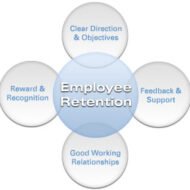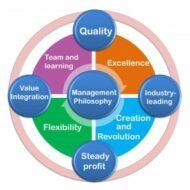Posted by Managementguru in Business Management, Human Resource, Organisational behaviour, Principles of Management, Training & Development
on Mar 19th, 2014 | 0 comments

New Paradigms in Employee Retention What is Employee Retention: It refers to the various policies and practices which let the employees stick to an organization for a longer period of time . It refers to the ability of an organization to retain its employees. HRM Practices: A company to ground itself successfully in the chosen field of activity should adhere to sound human resource management practices, as it is firmly believed that human resource is an asset and investment in human capital paves way for comprehensive development. Many firms fail, in spite of being resourceful in terms of capital, infrastructure and technology. The reason shall be attributed to ineffective handling of human skills or misappropriation of human potential. Human resource management involves not only in recruiting and selecting the right people but also empowering them by suitable training to enhance their technical skills and expertise to perform tasks. The Purpose of Training: Training ultimately aims at converting theorists to performers and orients itself towards accomplishing the enterprise objectives. Big corporate companies concentrate on talent acquisition from the pool of fresh graduates and experienced hands in the IT industry as well. They create a lively corporate atmosphere with “an intelligence network” contributing to the success of the organization. Recruitment and Selection: If you have a feeling that, recruitment and selection are mere procedures to be followed for the sake of selection of human resource, kindly change that notion. These are the crucial steps which determine the fate of your organization. People from different disciplines form a team to achieve the goals and objectives of your organization. Leading a group with such diversity is a feat in itself. Selecting knowledge workers whom you believe will achieve your corporate mission and devising the human resource practices in accordance with their work-life balance will yield great results. Training Programmes: Training programs are developed for different spheres of activity by experienced trainers under the guidance of the top management. Proper training to the trainees ensures maximum work done in minimum time. Training not only makes individuals more informative and knowledgeable but also action buffs. Learning is a key process in training that brings about the desired change in behavior. Corporate companies are also concerned about the career prospects of employees working for them, as they are very well aware of the fact that providing lateral and vertical growth prospects for their workers is the only possible way to retain them. Another way for employee retention is to offer compensation on par or higher than industry standards and periodic review of their pay or compensation in accordance with the performance standards. This method of evaluation is suitable only for companies where workers are highly self motivated and have the capability to understand what it takes to reach the next level in their career ladder. Flexi-Timings: Flexibility is introduced in work life by some of the big corporates who try to visualize the practical problems faced by their employees, particularly women, who come to work. They offer “flexi-timings” in work and support by running “crèche” to nurture new borns. It has been proved that a small siesta after lunch improves the brain activity. The HR policies formulated by the management must encompass all the elements needed for a holistic vision, mission and business growth. This can be made possible by maximizing the efficiency of human capital that adds value to the organization. Note: Companies will also continue to remain generous with pay packages but the big change will be that they will invest a lot more in training and development. “Acquiring talent is much more expensive than grooming...

Posted by Managementguru in Business Management, Organisational behaviour, Principles of Management
on Mar 6th, 2014 | 0 comments

Corporate Philosophy of Management CORPORATE PHILOSOPHY OF MANAGEMENT calls for creating a framework of values, beliefs and ethical standards which are considered to be vital for an effective management. They must be embedded in formal and informal philosophical statements which are then communicated to the fraternity of that organization. From a broader perspective, the LEADER has to have a VISION as to where he is heading his company in the next three to four years. Corporate Objectives provide vision as well as direction and map for bold decisions to be taken regarding NEW MARKETS MARKET SHARE PRODUCTS SERVICES etc. , Now the organization is in a position to decide and prioritise the VALUES AND COMPETENCIES it expects from its managers. For example, if the situation favors the business expansion to new markets, say, European or Asian, then an organization has to develop competence in areas like LANGUAGE AND CULTURE, besides marketing and business skills. Different Philosophies of Management: Well, you might have been inspired with JAPANESE PHILOSOPHY OF MANAGEMENT, EASTERN OR WESTERN PHILOSOPHY OF MANAGEMENT t. But what is the fun? If you don’t have A SOUND MANAGEMENT PHILOSOPHY of your own, to simply put it, you don’t have a broad set of principles to back up your management development process which is a generic one. Ideally speaking, you should be able to develop a concrete SYSTEM that is made up of FOOL PROOF policies and procedures; try to develop a professional team of executives who can take up your vision to the next level; these measures will prove worthwhile in the long run. You are left without any choice but to develop “truly” INTERNATIONAL MANAGERS who could transcend nationally and the location of any specific job consideration. This is what Ideal management philosophy means to me, A holistic vision of the future A solid set of principles(values, beliefs) Sound policy definition Management development programmes Autonomy to my work force Always “yes “to new technology Development of women managers Flexible leadership Social responsibility Contribution to the growth of my Country’s economy Strategic Perspective: Major environmental shifts now demand a more strategic perspective from those who manage and lead in organizations; “GLOBALISING” in the quest for major market share brings in new opportunities for growth and prosperity. Organizations are now espousing values that regard people, not as costs to be minimized, but AS “ASSETS TO BE MAINTAINED AND DEVELOPED.” An open systems approach of management is likely to overcome many of the problems created by the piecemeal approach. Instead of looking at management development in isolation, see it as an integral part of a wider organizational system that takes care of the processes through which people working for the firm take care of themselves leading to self...




